Bizzare Bazaar
Back to Contents of Issue: May 2004
|
|
|
|
by Lucille Craft |
|
|
Once upon a time, about the only customers in Japan for used cars were scrap dealers. But in recent years huge, high-tech bazaars have emerged across Japan, efficiently dispatching Japan's unwanted cars, trucks and buses to dealers who in turn channel the vehicles to everywhere from Barbados to Burma.
"Used cars are still quality cars. They can be driven three or four years. Every right-hand country in the world is taking these cars now," says Mike McCarthy, owner of Proficient Export Services in Nagoya, and a regular participant in the USS Company Nagoya auction, which runs until almost midnight every Friday.
Steven Bennington, another dealer in Nagoya, says Africa, South America, Russia and the Caribbean -- even Iraq, Iran and Burma -- eagerly snap up used Japanese cars. But the 15-year-old veteran says he has his hands full exporting to England, Ireland, Australia and New Zealand.
Introducing one of the hottest businesses in Japan right now -- used-car auctions. It may not be as glamorous as robots or IT, but hyper-efficient auctions, such as those run by industry leader USS, draw buyers by the thousands. It's an auction without human auctioneers, hammers or gestures. Bidding is performed in silence, by the click of a button. An endless parade of sedans, compacts and SUVs for sale are displayed on the screen for a matter of moments, before an accelerated flurry of button-jabbing decides the new owner. In an average of 20 seconds, it's going, going, gone.
The 82,000 square-meter Yokohama site -- down the road from the national fuel-cell demonstration hydrogen station -- was previously owned by Cosmo Oil, a gritty industrial estate built on land reclaimed from Yokohama Bay in the city's Tsurumi Ward. So many tractor-trailers are roaring past on the double-decker highway it's impossible to look at the road without getting an eyeful of dust. But to USS spokesman Shigeo Hara, the location is as good as it gets: "We're close to Haneda Airport, the harbor--we have the best access here of any auction site."
Under the old system, "once the auctioneer got to know the buyers, he would favor the regulars and ignore bids from the rest," says Hattori. Searching for alternatives, he learned that Fujitsu had developed a point-of-sale auction system for meat, involving suspending numbered sides of beef and pork from the ceiling.
"At first it was difficult to get people used to it," he says. "But younger (Japanese) grew up on video games, and they embraced this system."
At USS's 12th and newest site, in Yokohama, vice president Shigeo Hara showed off amenities such as a prayer room, complete with foot-washing area, for Muslim dealers. The company is also considering adding lamb to the menu at its complimentary cafeterias. Of the 30,000 dealers who have registered with USS and are eligible to bid, Hara reckons about 1,000 are non-Japanese, concentrated in the Tokyo area and Nagoya, where the firm is headquartered.
A Japanese sedan with 60,000 miles on it can be had for just $2,000 here. Older models with more mileage -- so-called ELVs, for end-of-life -- and "recycle" cars, or junkers, are practically given away. In 2003, Japan's used-vehicle exports rose to an estimated record one million units.
Finicky Japanese consumers generally shun used cars, so unlike in the US, there is virtually no demand for secondhand vehicles. But Japan's junk is treasure in the third world. A surfeit of used Japanese cars is flowing to emerging markets from Sri Lanka to Kenya, Iraq and Afghanistan. Whenever and wherever consumers can't afford to buy new cars, increasingly they're buying old Japanese ones.
Tokyo representatives for GM, Ford and Daimler-Chrysler declined comment, but Detroit has good reason to be nervous about the tide of used Toyotas and Hondas washing into developing countries. The onslaught of exports could end up creating brand loyalty to Japanese cars in the handful of emerging markets left in the world. The dealers say that US cars -- while prized for their styling and brute horsepower -- are considered shoddy and unreliable, while used Japanese cars just keep on ticking. USS president Hattori is unapologetic. "The world is a big place. And Japanese cars are so reliable they can keep going for 200,000 miles. Even when they don't run anymore they can be broken down for parts," he says.
It hasn't been all smooth driving for used-car auctions and dealers. Some countries have complained that Japan is exporting its garbage problem to countries ill-equipped to handle high volumes of superannuated steel. USS official Shigeo Hara says he is worried about the trash problem in developing countries, but argues that policing the refuse is the government's job. As long as there are new cars -- and last year, new car sales here topped four million --used-car brokers are optimistic the secondhand business will thrive.
The Japanese Dream
His one-man company sends 30 to 40 cars a month to England and Dubai, where Ahmad maintains a showroom of 150 models. He once dealt in Japanese models but the brisk trade has attracted too many competitors, so now he deals solely in American and European marquees. On this particular afternoon, Ahmad decides to bid on a hulking '97 GM Astro Van. Dubai is merely a transshipment point for Africa and the Mideast, and chances are good the van will end up in Iraq. "For 12 years they couldn't buy anything," Ahmad notes with typical directness. "Now they'll buy anything in any conditon." With cheap gas and aid pouring in from the US, Iraqis don't worry about fuel economy, he points out.
Nothing so brutally burnishes or burns the reputation of an automaker quite like the secondhand business. Ahmad ruthlessly shoves his pen under a piece of door trim that has separated from the body on an American sedan, and points out several other flaws. In the Third World, American brands are famous for going kaput in a few years. Japanese cars, on the other hand, are the closest thing on wheels to immortality.
What Chinese once were to dry-cleaning and the Irish to the police force in the US, Pakistanis are to used-car exports in Japan. "We are the pioneers of the business. Japanese made the car and we introduced it to the world. Wherever you see a used car, a Pakistani introduced it," brags Sajjad, who serves as vice president of a cultural organization called the Pakistan Association of Japan. It was hardworking used-car dealers, Sajjad point outs, who built the several dozen mosques in Greater Tokyo in recent years.
Sajjad, who has been in the business 16 years and handles up to 100 units monthly, maintains a branch office in Toyama, on the north coasst of central Honshu, where enterprising Pakistani used-car dealers have been known to crowd piers clutching "Buy cars from us!" signs in Cyrillic whenever a Russian freighter calls.
Many other nationalities work the used-car trade, but none so aggressively as the Pakistanis, some of whom spray-paint and recondition cars bought at auction not only to sell to visiting Russians, but even for placement back into the car auctions. Sajjad confirms that illicit hidden repair shops, staffed by illegal Pakistani immigrants, are not uncommon.
Selling used cars in Japan can be a rough-and-tumble business. In early 2004 right-wing thugs in speaker-equipped trucks and with air rifles began harrassing a Saitama used-car auction, seeking payoffs. The attempted shakedown turned into a melee, with racist insults and fistfights.
Steered back to the subject of cars, Shepherd is equally dour. He began dealing in motorcycles, exporting 600 a year from Japan at his peak nearly 20 years ago. When conventional distributors cut their retail prices, he had to shift to used cars, but now is looking at abandoning exports altogether to focus on the Japanese domestic market.
"We reckon in a few years the export market will die out," he declares. He turns on the ignition in a pickup and guns the engine. Then a "wow!" from another dealer draws him to the front of the idling truck. Water leaks in an ominous stream from below the cab. Shepherd shrugs.
Exporting is becoming "more and more difficult," he says, noting that once-lucrative destinations have restricted imports of used cars from Japan or banned them altogether. "All the markets are closing up, so we're moving into the domestic market." He is trying to carve out a niche selling over the Internet to Japanese outside the major cities.
A popular model such as the RAV4 can be bought at auction for JPY200,000 and sell abroad for four times that much. Even subtracting shipping charges (JPY100,00 for a car, up to JPY400,000 for a truck) and time-consuming paperwork, the fees are substantial, particularly considering the near-absence of barriers to entry. While Sajjad says a real business requires at least "two to three million yen" in startup capital and an office, many here start with little more than a cellphone, a place to sleep on the floor of a friend's apartment and a pocketful of dreams.
Japanese have considerably more career flexibility than a freshly arrived Pakistani, but for Motoaki Hirayama, the pure capitalism inherent in trading used cars is as alluring as the potential financial rewards. "With new cars, the distribution outlets are fixed. But the used-car market," he says, "is up for grabs."
@ |
|
Note: The function "email this page" is currently not supported for this page.


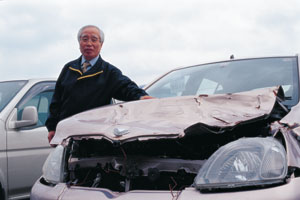 Japan's leading carmakers are expanding their reach into the US. But even in the poorest corners of the planet the Japanese are gaining a large and loyal following, thanks to a brisk trade in secondhand cars.
Japan's leading carmakers are expanding their reach into the US. But even in the poorest corners of the planet the Japanese are gaining a large and loyal following, thanks to a brisk trade in secondhand cars.
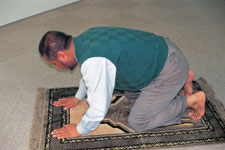 "Under the old-fashioned system of human auctioneers and bidding by hand signals, if we started at 10 a.m. and finished at 5 or 6 p.m., we would only have time to sell 350 cars a day," says USS president Futoshi Hattori. But with the point-of-sale system, volume suddenly surged into the thousands. Formerly each car was driven onto the arena floor, but to save time the company simply snaps digital photos of each vehicle and projects the images on massive screens at the front of the auctioneer-less auction hall, and via personal monitors installed at every dealer's seat; the newest auction site in Yokohama, opened in February, has room for 1,300 dealers. "With the point-of-sale system and by using video displays of the cars, our biggest auction site [in Chiba] can move 11,000 cars a day," boasts Hattori, calling his system the world's fastest.
"Under the old-fashioned system of human auctioneers and bidding by hand signals, if we started at 10 a.m. and finished at 5 or 6 p.m., we would only have time to sell 350 cars a day," says USS president Futoshi Hattori. But with the point-of-sale system, volume suddenly surged into the thousands. Formerly each car was driven onto the arena floor, but to save time the company simply snaps digital photos of each vehicle and projects the images on massive screens at the front of the auctioneer-less auction hall, and via personal monitors installed at every dealer's seat; the newest auction site in Yokohama, opened in February, has room for 1,300 dealers. "With the point-of-sale system and by using video displays of the cars, our biggest auction site [in Chiba] can move 11,000 cars a day," boasts Hattori, calling his system the world's fastest.
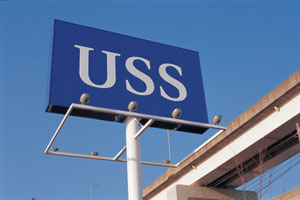 USS is short for the techie-sounding "Used car System Solutions," but the acronym originally stood for something considerably less high falutin'. Back in 1980, "USS" was President Hattori's own sober assessment of the firm's tenuous existence: Used car Scramble Survival. The company, which once had to plead with supermarket owners to temporarily lend their vacant lots for auctions, gained a new lease on life with the adoption of high tech in the fall of 1982.
USS is short for the techie-sounding "Used car System Solutions," but the acronym originally stood for something considerably less high falutin'. Back in 1980, "USS" was President Hattori's own sober assessment of the firm's tenuous existence: Used car Scramble Survival. The company, which once had to plead with supermarket owners to temporarily lend their vacant lots for auctions, gained a new lease on life with the adoption of high tech in the fall of 1982.
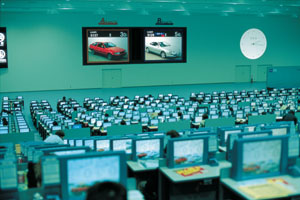 In fact, perhaps no other legal profession in this country is as wide open to foreigners as the used-car business. Men from Pakistan, Sri Lanka, the UK and scores of other countries -- some without Japanese language skills or the start-up guarantee money usually required to register as a bidder -- flock to the countrywide used-car auctions held by USS, Ikeda and other companies.
In fact, perhaps no other legal profession in this country is as wide open to foreigners as the used-car business. Men from Pakistan, Sri Lanka, the UK and scores of other countries -- some without Japanese language skills or the start-up guarantee money usually required to register as a bidder -- flock to the countrywide used-car auctions held by USS, Ikeda and other companies.
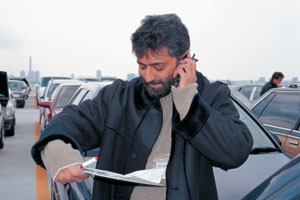 By swerving downmarket, USS expects to handle two million cars a year by 2006. The firm's flagship auction in Noda, Chiba Prefecture, is due for a facelift and is scheduled to reopen this summer on a 529,000-square-meter piece of land, enough space to bid six cars at once, seat 2,400 dealers and handle 15,000 vehicles a day.
By swerving downmarket, USS expects to handle two million cars a year by 2006. The firm's flagship auction in Noda, Chiba Prefecture, is due for a facelift and is scheduled to reopen this summer on a 529,000-square-meter piece of land, enough space to bid six cars at once, seat 2,400 dealers and handle 15,000 vehicles a day.
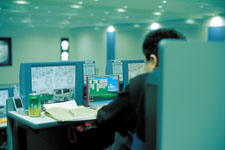 Ahmad's life has followed a trajectory fairly common in Japan's used-car trade: Go to Japan to study, graduate to exporting used cars. "It's very easy," he says. "You look at the car. And after, you export it." Ahmad's English is now as rusty as the exhaust pipes on an old Chevy, and he is relieved to switch to Japanese, which he speaks fluently. In fact, Ahmad in many ways is living what might be called The Japanese Dream. He married a local woman, traded in his nationality to become a Japanese citizen and came close to buying a house in the Tokyo suburbs for his wife and three kids. At the auctions he attends three times a week, he finally found the car of his dreams, a '95 yellow Mustang, for four million yen. His religious and cultural reservations aside, life has been good to Ahmad.
Ahmad's life has followed a trajectory fairly common in Japan's used-car trade: Go to Japan to study, graduate to exporting used cars. "It's very easy," he says. "You look at the car. And after, you export it." Ahmad's English is now as rusty as the exhaust pipes on an old Chevy, and he is relieved to switch to Japanese, which he speaks fluently. In fact, Ahmad in many ways is living what might be called The Japanese Dream. He married a local woman, traded in his nationality to become a Japanese citizen and came close to buying a house in the Tokyo suburbs for his wife and three kids. At the auctions he attends three times a week, he finally found the car of his dreams, a '95 yellow Mustang, for four million yen. His religious and cultural reservations aside, life has been good to Ahmad.
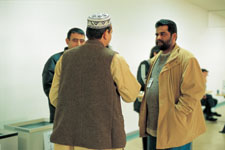 Inside the auction hall, Raja Ahmed Sajjad has finished scoping the merchandise and is doing what car dealers seem to spend most of their time doing at the daylong auction: Napping, playing computer games, reading the paper, or chatting with girlfriends while waiting for their merchandise to go on the block.
Inside the auction hall, Raja Ahmed Sajjad has finished scoping the merchandise and is doing what car dealers seem to spend most of their time doing at the daylong auction: Napping, playing computer games, reading the paper, or chatting with girlfriends while waiting for their merchandise to go on the block.
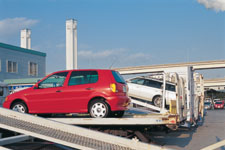 The auctions draw dealers not only from developing countries, but also from the UK and former British colonies, men of working-class backgrounds who share an infatuation with cars and the adrenalin-raising thrill of the bazaar. Back on the car lot, a portly Brit named Paul Shepherd, whose small firm trades about 150 cars a month, also orbits in a cloud of angst, but for entirely different reasons. He wants to discuss his case of "race discrimination": Filipina hostess clubs in his town have suddenly banned foreigners.
The auctions draw dealers not only from developing countries, but also from the UK and former British colonies, men of working-class backgrounds who share an infatuation with cars and the adrenalin-raising thrill of the bazaar. Back on the car lot, a portly Brit named Paul Shepherd, whose small firm trades about 150 cars a month, also orbits in a cloud of angst, but for entirely different reasons. He wants to discuss his case of "race discrimination": Filipina hostess clubs in his town have suddenly banned foreigners.
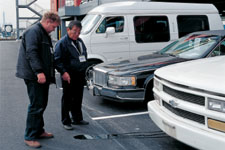 USS operates a cafeteria for dealers adjacent to the auction hall, and the men drift between the two areas throughout the day. Placid amidst the tobacco haze in the cafeteria, Motoaki Hirayama nurses a cup of coffee. He once worked supplying construction equipment for the U.N. When he received orders to Africa, he decided it was time to move on. Looking for a job that would exploit his English skills and exporting experience, he began dealing in used cars ten years ago. He now earns "two or three times" what he did as a salaried employee.
USS operates a cafeteria for dealers adjacent to the auction hall, and the men drift between the two areas throughout the day. Placid amidst the tobacco haze in the cafeteria, Motoaki Hirayama nurses a cup of coffee. He once worked supplying construction equipment for the U.N. When he received orders to Africa, he decided it was time to move on. Looking for a job that would exploit his English skills and exporting experience, he began dealing in used cars ten years ago. He now earns "two or three times" what he did as a salaried employee.



